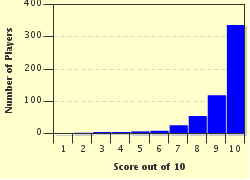Quiz Answer Key and Fun Facts
1. What is the term used for any dementia that occurs before the age of 65?
2. Pugilist Dementia is a disorder often seen in patients with which of the following in their medical history?
3. Multi-infarct dementia is caused by which of the following?
4. What is usually the first symptom of Semantic Dementia?
5. Alcohol dementia differs from most types of dementia in which of the following ways?
6. What is the most common first sign of Alzheimer's Dementia?
7. What is 'sundowning', a behavior often seen in dementia patients?
8. A person can have more than one type of dementia at the same time.
9. What is the biggest problem that faces dementia patients who smoke?
10. Playing on Fun Trivia is generally a good idea for subjects in the early stages of dementia.
Source: Author
dcpddc478
This quiz was reviewed by FunTrivia editor
CellarDoor before going online.
Any errors found in FunTrivia content are routinely corrected through our feedback system.

